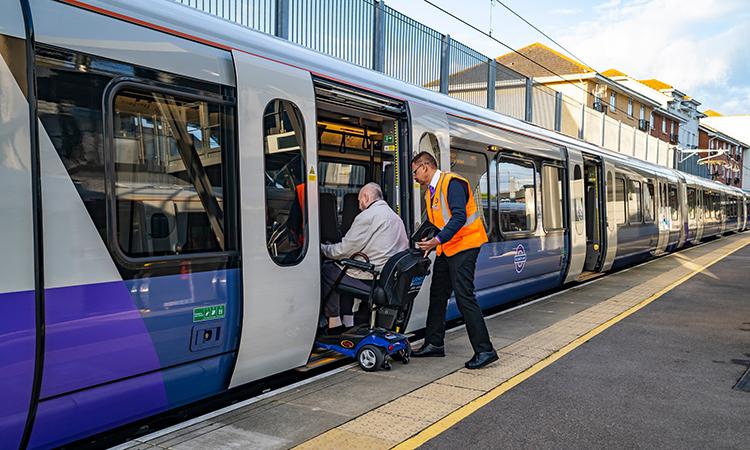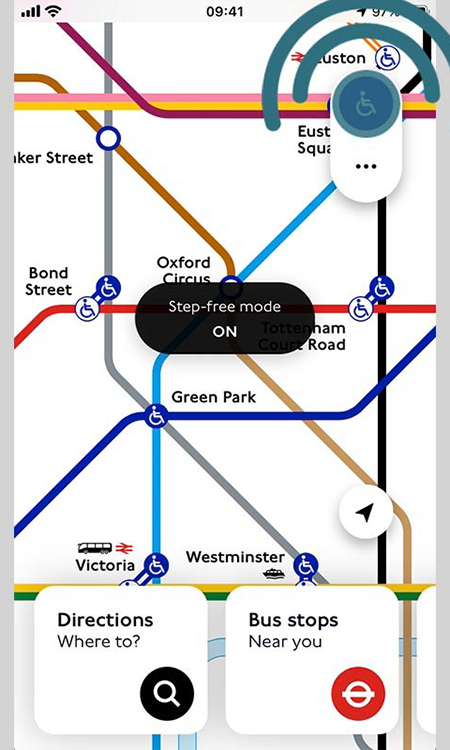Transport for London is here to support you on your accessible journeys
- Like
- Digg
- Del
- Tumblr
- VKontakte
- Buffer
- Love This
- Odnoklassniki
- Meneame
- Blogger
- Amazon
- Yahoo Mail
- Gmail
- AOL
- Newsvine
- HackerNews
- Evernote
- MySpace
- Mail.ru
- Viadeo
- Line
- Comments
- Yummly
- SMS
- Viber
- Telegram
- Subscribe
- Skype
- Facebook Messenger
- Kakao
- LiveJournal
- Yammer
- Edgar
- Fintel
- Mix
- Instapaper
- Copy Link
Posted: 13 December 2022 | Tricia Wright - Transport for London | No comments yet
Tricia Wright, Chief People Officer at Transport for London, details the ways in which TfL is working to make the city’s transport network easier to use for all passengers, and highlights that, though a lot has been done, this work is only the beginning.


Public transport is intrinsic to life in the capital for Londoners and visitors alike. It connects people and places and opens up the city. However, barriers to using our transport system can limit life and health opportunities. That is why we have a vision, and a public duty, to improve our network so that it is truly accessible for all of our customers.
Making journeys simpler and smoother for all
We have a vision, and a public duty, to improve our network so that it is truly accessible for all of our customers”
Since 2016, we have added step-free access to 24 stations on our London Underground (Tube) network – including, most recently, the Harrow-on-the-Hill and Moorgate stations. With the completion of step-free access schemes on the wider Transport for London (TfL) network, the average additional time required for step-free journeys has now been reduced to around 6.7 minutes. We are also working with third parties to deliver step-free access at Knightsbridge, and our station upgrade at Bank will also deliver step‑free access to the Northern line and Docklands Light Railway (DLR) Interchange only. The transformational Elizabeth line has been built to provide step-free access throughout to help to connect more people to more of London. The new trains have four dedicated wheelchair spaces in the fifth carriage, as well as dedicated priority seats in every carriage of the train.
Our bus fleet is the most accessible in the world, with each of London’s 8,500 accessible buses being fitted with automatic wheelchair ramps, as well as the innovative iBus audio-visual system to help those with impaired vision or hearing to travel more easily.
We invest over £30 million a year in our Assisted Transport Services for Londoners. We have a free travel mentoring service to support people using public transport, so that they can gain confidence to become independent travellers. We also provide a range of assisted door-to-door travel services, such as Dial-a‑Ride, our multi-occupancy service that is free for people who are unable to, or face considerable challenges when, using the wider public transport network. Alongside London Boroughs, we also fund Taxicard, which is managed by London Councils and provides a subsidised taxi service for disabled customers.
Fostering an open and honest relationship with passengers
The COVID-19 pandemic had a devastating impact on our finances and, because London is reliant on fare income unlike any other major city, we require proper and long-term funding from government to succeed with the mission of ensuring that everyone can access public transport.
We are always open to feedback and encourage passengers to get in touch about their experiences on our network. Having a truly accessible transport network is essential to ensuring equitable access to London; however, we know that we are not perfect and there are instances where our service quality falls short of our usual standard. We recognise that these shortcomings are felt more intensely by our disabled customers and are working hard to make journeys easier and more accessible. I hope that past negative experiences and stories do not discourage anyone from choosing public transport.
Utilising the experience and expertise of trusted partners
Introducing accessible improvements and innovations on the network is a continuous and collaborative effort. Our policies and implementations are guided by our Independent Disability Advisory Group (IDAG), which has a panel of 10 members appointed for their professional expertise and extensive knowledge of disability access, transport and customer service. Each member has experience of living with a disability, such as sensory or mobility impairments, mental health, specific learning difficulties or a combination. IDAG provides invaluable advice, acting as a sounding board and providing strategic and practical recommendations based on inclusive best practice.
Enhancing accessibility with effective data


Example image of the TfL Go app, with ‘Step Free Mode’ active.
For customers with reduced mobility, starting a journey can be a daunting thought, and the first step can often be the hardest one to take. Planning ahead can increase confidence and control, so this is why we’re focusing on providing more personalised and up-to-date information to enable our customers to make the journey that meets their needs; whether that’s taking the route with the least amount of walking, knowing when our trains and stations might be less busy, or real-time information on whether lifts along their route are in service. We’re also bolstering our accessibility datasets to enable greater choice and personalisation in the future and making these available through our TfL Go app and website. We know that having ready access to clear and accessible information on-the-go is essential, and that’s why we’re expanding our 4G network on the Tube to enable greater live access to critical journey planning information when it is needed most. There are other innovations and ideas underway, and it’s an ever-evolving piece of work.
Offering on-hand support
We offer a turn-up-and-go passenger assistance service on London Underground, London Overground and most Elizabeth line services, which aims to help people travel as independently as possible. Passengers are encouraged to simply turn up at stations and inform a member of staff of the assistance that they need. Staff communicate between stations to ensure that the customer’s journey is as seamless as it can be, including escorting customers from the ticket hall to the platform to ensure that they are boarded safely, as well as arranging for the customer to be met off the train at the destination, as well as any interchange stations, and accompanied from the platform to the station exit so that they can continue their journey. We know that excellent customer service is critical for enabling successful journeys for many of our customers, which is why we’re committed to supporting our staff with Disability Equality Training and ensuring that customers receive the level of support that they expect from us.
In stations, customers are met with strategically placed and thought-out wayfinding information. Our team has worked closely with various stakeholder groups, including accessibility groups, to gather their views and inputs on our signage. As a result, we developed a consistent approach and standard to improve accessibility signage on our network and wayfinding in stations, including signposting lifts and boarding points more clearly.
Taking consideration when travelling
We will continue to proactively seek feedback from people with accessibility needs about their experience of public transport”
We must not forget about small acts of kindness that we can all do whilst travelling to make journeys better for everyone. My message to all passengers is to be more considerate and conscious. Look out for others who may need a bit more time, care and courage on their travels and be aware that other people’s needs might not always be visible. Offering your seat to someone who may need it more can make someone’s day and ensures that more Londoners will use our network. Conversely, if someone asks for a seat for any reason at all, please do not hesitate to offer yours and do not wait for others to offer theirs. Our Please Offer Me a Seat badge has been in operation since 2017 to help those needing a seat to get one. The badge has helped more than 100,000 people on the network. To those who need them, please remember that they are free-of-charge to order from our website and no medical proof is needed to be eligible for one. There are easily identifiable priority seats and priority seat stickers across our network.
Meanwhile, we will continue to proactively seek feedback from people with accessibility needs about their experience of public transport. In 2021, we launched a consultation about what to prioritise when upgrading the step-free Tube network. These responses will be analysed alongside our transport modelling and will be used to shape future improvements when more funding is available. I look forward to sharing the results of this soon and, whilst we have a long way to go, TfL will continue to strive for a more accessible future for everyone.


Related topics
COVID-19, Infrastructure & Urban Planning, Passenger Accessibility, Passenger Experience, Public Transport, Travel & Passenger Information
Issue
Issue 3 2022
Related modes
Bus & Coach, Overground, Rail, Taxi, Underground
Related cities
London
Related countries
United Kingdom
Related organisations
London Councils, Transport for London (TfL)
Related people
Tricia Wright







